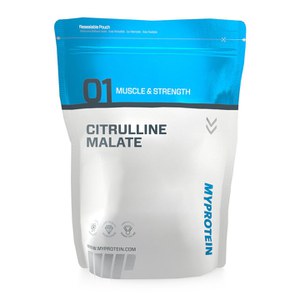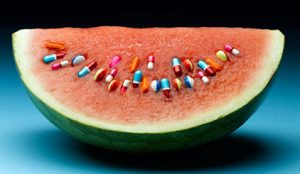By Anthoney J. Andersen – Steroidal.com
Bigger. Faster. Stronger.
This has become the slogan/motto for the bodybuilding world for the past decade or so. Whether you’re weight lifting at the professional level, or you’re simply an exercise aficionado, there comes a point where your body demands that you take your training to the next level.
However, with the overwhelming plethora of sports supplements on the market today, it can be quite intimidating as to which supplement you can trust to get the results that you want.
One amino acid that often goes overlooked – and isn’t mentioned as frequently as say L-glutamine, L-arginine and L-leucine – is L-citrulline malate.
But what makes this amino acid a viable candidate for muscle growth and performance?
Let’s find out.
THE DISSECTION OF AN AMINO ACID
Amino acids are the basic building blocks of the body. They are also sources of energy – like fats or carbohydrates. However, amino acids are structurally characterized by the fact that they contain nitrogen (N), whereas fats and carbohydrates do not.
Therefore, only amino acids are capable of forming tissues, organs, muscles, skin and hair.
 According to an article on Aminoacidstudies.org, the importance of amino acids as the precursors of enzymes and neurotransmitters is often underestimated. As such, amino acids regulate almost all of the metabolic processes in the human body, and they are essential for a healthy body.
According to an article on Aminoacidstudies.org, the importance of amino acids as the precursors of enzymes and neurotransmitters is often underestimated. As such, amino acids regulate almost all of the metabolic processes in the human body, and they are essential for a healthy body.
BENEFITS OF AMINO ACIDS
Amino acids are small molecules that make up protein – a critical nutrient in muscle maintenance, tissue repair, and immunity. According to an article on SFgate.com, when you consume protein, your body breaks it down to create a pool of single amino acids that your cells incorporate into new proteins as needed. For better absorption, nutritionists and health experts recommend consuming amino acids in the form of whole-food proteins, rather than taking them through supplements.
Branched-chain amino acids (BCAAs) are an example of a supplement containing a protein substitute, specifically the amino acids leucine, isoleucine and valine. Roughly one-third of your skeletal muscle consists of these three amino acids, and they can play a role in exercise efficiency and muscle recovery after an intense workout session.
The BCAAs may decrease protein breakdown during exercise, increase protein synthesis during post-exercise recovery and decrease feelings of fatigue associated with physical activity.
THE POWER OF CITRULLINE MALATE
If you’re regularly involved in strenuous exercise, or concerned about your cardiovascular health, then you might find citrulline malate to be of potential value. Citrulline malate is an amino acid that is considered to be “non-essential,” meaning that your body produces a sufficient amount, and dietary intake isn’t essential.
According to Livestrong.com, modern research suggests that L-citrulline malate – the chemical form of citrulline available as a supplement – can boost energy and may help lower your risks of certain chronic problems.
EFFECTS OF CITRULLINE MALATE ON METABOLISM
You can obtain citrulline from food, or your body can manufacture it from ornithine, another amino acid you obtain from food – through a biochemical process called the urea cycle. This cycle helps rid your body of ammonia – a waste product of protein digestion. After your digestive system metabolizes citrulline malate into citrulline, enzymes in your liver cells convert it to another amino acid called arginine. Other enzymes in the body will then convert arginine into nitric oxide in a process that also produces new citrulline molecules.
Nitric oxide is a vasodilator that can help protect you from cardiovascular problems by lowering blood pressure and improving blood flow to your organs, according to experts at the University of Southern California. Although your body can make citrulline in this way, research suggests that consuming extra citrulline may have significant health benefits.
ENHANCED EXERCISE TOLERANCE
Research shows that using citrulline during exercise might enhance performance. According to Myprotein.com, there have been tests on animals that were fed citrulline: these animals were able to perform strenuous tasks for longer periods of time, and had lower levels of blood ammonia and lactate, than the animals that were not given citrulline.
Several studies suggest that supplementation with citrulline malate may improve the health of your arteries and heart. There was a study done in the “Cardiology Journal” in 2010 that involved people with heart failure. The study found that when citrulline malate was consumed during a two-month period, performance on the treadmill increased and overall blood pressure decreased – resulting in increased heart function.
When citrulline malate is taken before a strength training session, the lower blood pressure allows the user to experience a bigger “pump” during the workout because the delivery of the blood to the muscle tissues is increased, which causes greater cellular volume of the muscle.
WHEN TO TAKE CITRULLINE MALATE AND ITS DOSAGE
Since citrulline malate supplements help athletes boost circulation, promote physical endurance and support muscle growth, the timing for which the user should take it, is vital. The recommended time to consume citrulline malate is 20 to 30 minutes before a workout. Using citrulline malate as a pre-workout supplement can improve overall performance, and will allow the user to partake in a strenuous, physical activity for a longer period of time.
The suggested dose to take in a 24-hour period is six to 18 grams. Six grams is the minimal amount needed to notice any effects, and doses taken at 18 grams per day have been known to have extremely noticeable effects on the body. For optimal results, it’s recommended that you split doses into three different times throughout the day (six grams each), one of the times being a pre-workout.
 CONCLUSION
CONCLUSION
L-citrulline malate has the ability to boost nitric oxide production in the body. Nitric oxide helps your arteries relax and function better, which improves blood flow throughout the body – specifically to the muscle tissues. This can be helpful for treating and preventing many diseases – such as reducing the risk of heart disease, easing the symptoms of mild-to-moderate erectile dysfunction and help people with blood vessel problems, such as slow wound healing due to diabetes.
According to WebMD, there are currently no side effects associated with L-citrulline malate. However, it may affect the way certain drugs work in your body. Doctors recommend that you do not take L-citrulline supplements if you are taking:
- Nitrates for heart disease.
- Erectile dysfunction drugs such as Cialis, Viagra or Levitra.
Consult with your doctor first, before starting L-citrulline malate supplementation.







